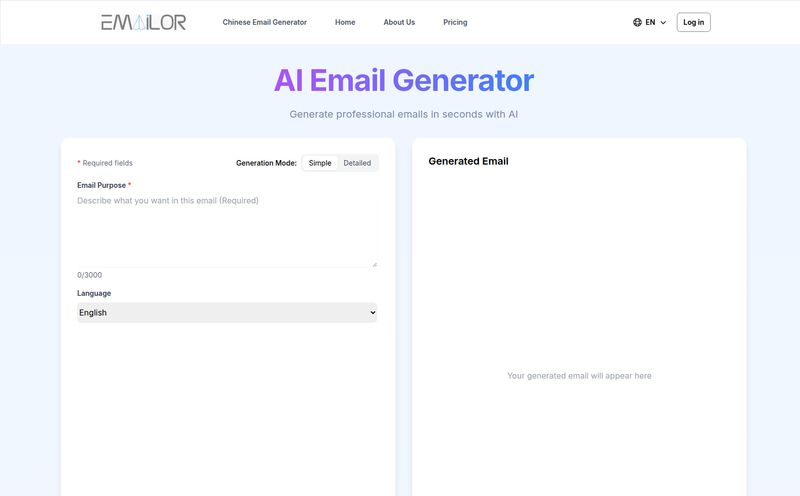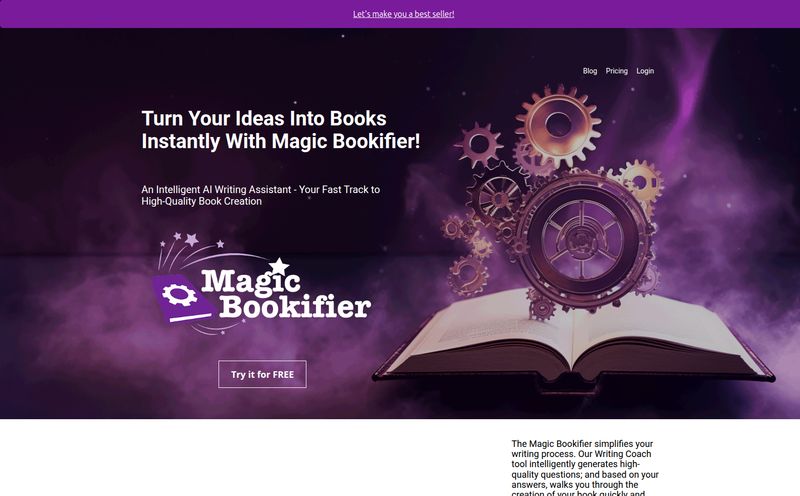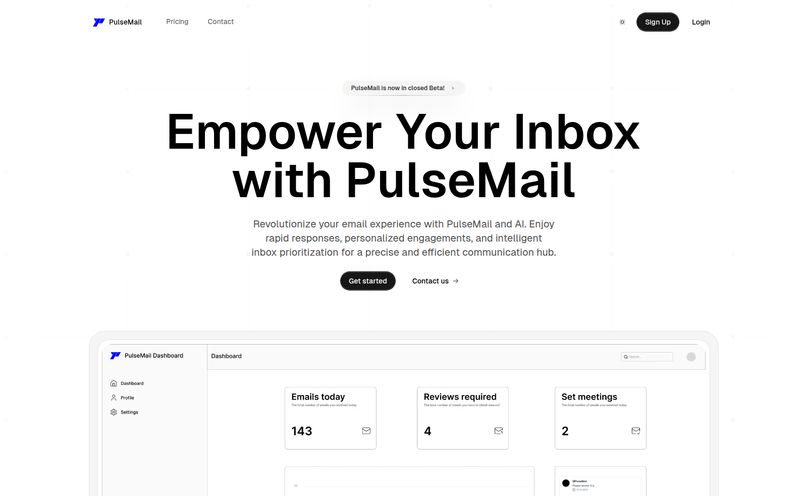As writers, we spend an almost comical amount of time looking for the perfect writing software. It’s the ultimate form of productive procrastination, isn't it? We jump between the black hole of features that is Scrivener, the too-basic-for-a-novel feel of Google Docs, and that one app we bought on a whim and never opened again. We're all Goldilocks, searching for a tool that’s just right.
I’ve been in that loop for years. I want power, but I don’t want a cockpit with a million confusing buttons. I want organization, but I don’t want to spend more time tagging scenes than writing them. So when I stumbled upon Scene One, my curiosity was definitely piqued. It promised simplicity. It promised focus. Could this be the one? I decided to take it for a spin.

Visit Scene One
So What Exactly is Scene One?
At its core, Scene One is a web-based book writing app. The whole idea behind it is to strip away the unnecessary complexity that plagues so many other platforms. It’s designed to get you writing, fast. Think of it as a clean, well-lit digital room with all your tools neatly arranged on a workbench, rather than a cluttered garage where you can’t even find your hammer.
Everything you write is stored in the cloud, which is a non-negotiable for me these days. I’ve lived through the trauma of a corrupted hard drive and lost chapters—never again. With Scene One, you can log in on your laptop at home, your tablet at a coffee shop, or even your phone in a moment of desperate inspiration, and your story is just… there. Safe and sound.
The Features That Actually Help You Write
Okay, let's get into the good stuff. What does this tool actually do? It’s not just a blank page, it has some seriously thoughtful features built in that feel like they were designed by, you know, actual writers.
A Clean, Distraction-Free Writing Space
The first thing you notice is the editor. It's clean. Beautifully, blissfully clean. There aren’t a dozen toolbars screaming for your attention. It's just you and your words. You organize your book by scenes, which are listed on the side. You can easily drag and drop them to restructure your story. It’s intuitive, which is a word that gets thrown around a lot, but here it actually fits.
The 'Save the Cat!' Integration is a Godsend
Now, this is the feature that made me sit up and pay attention. Scene One has a built-in Save the Cat! Beat Sheet Manager. If you've ever read Blake Snyder's book, you know how incredibly useful this structure is for plotting a story that works. I've spent countless hours trying to shoehorn this structure into spreadsheets or Trello boards. Here, it’s integrated right into the software.
You can outline your entire novel using the 15 key beats, from the Opening Image to the Final Image. It keeps your story's skeleton in view, making sure your pacing is on point. For plotters like me, this is an absolute game-changer. It’s like having a story structure expert looking over your shoulder (in a helpful, non-creepy way).
Building Worlds with a Custom Wiki
Every fantasy or sci-fi author knows the pain of the 'story bible'—that sprawling, chaotic document where you keep track of characters, places, magic systems, and weird alien laws. Scene One tackles this with a custom wiki. You can create entries for anything you want, and it’s all stored and searchable within your project. No more alt-tabbing to a hundred different notes. It’s your own private encyclopedia for the world you've built. Simple, effective, and it keeps you in the creative flow.
Let's Talk About the AI Writing Assistant
Ah, the AI elephant in the room. A lot of writers are skeptical about AI, and I get it. I’m not looking for a robot to write my book for me. But I’ve found that an AI partner can be a fantastic tool for breaking through writer’s block or brainstorming ideas. Scene One's AI assistant is designed to be a co-creator. You can ask it to expand on a scene, suggest a character description, or even just help you rephrase a clumsy sentence. It’s not about replacement; it’s about assistance. The paid plans come with a monthly word allowance, which feels fair. It’s a tool, and like any tool, it’s all about how you use it.
Okay, But How Much Does It Cost?
Pricing is always the big question. Scene One has a pretty straightforward tiered system, which I appreciate. There’s a genuinely useful free plan, which isn't just a gimmick. It lets you get a real feel for the platform before committing.
Here’s a quick breakdown of their plans:
| Plan | Price | Who It's For |
|---|---|---|
| Free | Free | The curious writer. You can write one full story (up to 100k words) and get a 2-week trial of all standard features. Great for testing the waters. |
| Standard | $9 / month | The dedicated novelist. Unlimited stories and words, plus all the core organizational features. This is the sweet spot for most authors. |
| AdvancedAI | $16 / month | The AI-curious author. You get everything in Standard plus 50,000 AI-generated words per month. Perfect if you want a creative partner. |
| ProfessionalAI | $25 / month | The power user. This bumps your AI allowance up to 150,000 words per month. For those who heavily integrate AI into their workflow. |
They also offer one-time AI word boosters if you ever run out, which is a nice touch.
The Not-So-Perfect Bits
No tool is perfect, right? While I'm a big fan, there are a couple of things to be aware of. The free plan is great for a trial, but it is limited. You only get one story, and the best features are part of the two-week trial period. After that, you'll likely want to upgrade if you're serious. Also, the AI word counts on the paid plans might feel a bit restrictive if you're an extremely heavy user, but for most people, I think they're pretty generous. These aren’t deal-breakers for me, just things to keep in mind.
Frequently Asked Questions About Scene One
Is Scene One a good alternative to Scrivener?
I'd say it's a fantastic alternative, especially if you find Scrivener overwhelming. Scrivener is incredibly powerful but has a steep learning curve. Scene One prioritizes simplicity and an intuitive user experience. If you want to spend less time learning software and more time writing, Scene One is probably a better fit.
Can I import my existing manuscript into Scene One?
Currently, Scene One is focused on creating new work within the platform. You can't directly import a .docx or .scriv file and have it automatically separated into scenes. However, you can easily copy and paste your text into new scenes, which is what I did with an old project.
Is my work safe in the cloud?
Yes. This is a huge plus. All your writing is securely stored in the cloud, meaning you don't have to worry about local file corruption or losing your laptop. It also allows you to acces your work from any device with a web browser, which is incredibly freeing.
Do I have to use the AI features?
Not at all! The AI Writing Assistant is a completely optional tool. If you just want a great, organized, cloud-based writing environment, the Standard plan is perfect and doesn't push the AI on you. You can completely ignore it if it's not your cup of tea.
My Final Verdict
After spending some quality time with Scene One, I’m genuinely impressed. It’s managed to strike that elusive balance between useful features and elegant simplicity. It doesn’t try to be everything to everyone. Instead, it focuses on being an excellent tool for writing, outlining, and organizing a novel. The 'Save the Cat!' integration alone is worth the price of admission for a plotter.
If you're tired of fighting with your software and just want to get back to the joy of telling a story, I'd strongly encourage you to give Scene One a try. Start with the free plan. Play around with it for a week or two. You might just find that it's the 'just right' you've been searching for all along.



